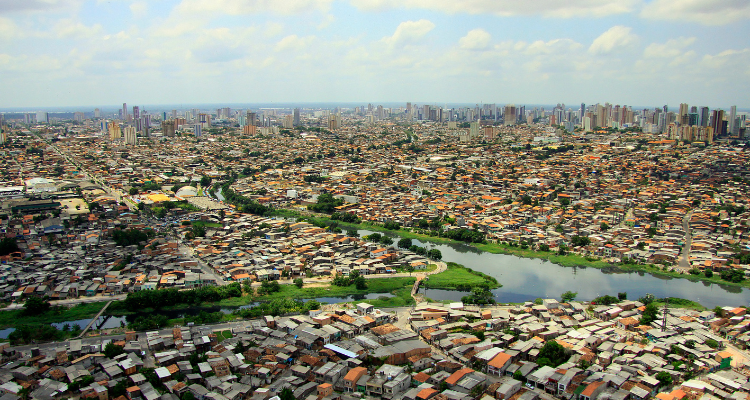This year’s UN climate summit, known as COP30, will take place in the heart of the Amazon for the first time.
It’s a milestone for Latin America, but due to high costs for travel and accommodation, as well as complex logistical issues, many of the region’s own reporters are struggling to get there.
The coastal city of Belém is expecting 45,000 travelers fighting for just 18,000 hotel beds usually available. The government says that they are working to increase offerings, but as a result, hotel prices have skyrocketed.
Last week, Brazil’s Climate Observatory released a public statement that the accommodation crisis in the capital of Pará "threatens to make COP30 the least inclusive in history" and is already driving away State delegations and civil society representatives.
“Costs are significantly higher,” Fermin Koop, managing editor at Dialogue Earth and a COP reporting veteran, told LatAm Journalism Review (LJR). “In previous COPs, even in cities with high living costs, there was usually a range of accommodation options within commuting distance. In Belém, [Brazil], the limited supply and high demand have pushed prices well beyond what many journalists or their outlets can pay.”

Metropolitan Region of Belém, Brazil (Getty/Canva)
Environmental journalists from Latin America are adopting different strategies to overcome the financial and logistical barriers for attending. They’re shortening stays, sharing accommodations and seeking financial support from partner organizations to cover the event in person.
They worry the situation in Belém will reduce the diversity of voices reporting on the conference and sharing their communities’ perspectives.
Koop is also a mentor at the Earth Journalism Network, a global network that has a grant program for journalists to travel to the COP. He said the high costs of travel have forced reporters to book earlier than usual and plan coverage more strategically to make the most of a shorter stay.
 Eduardo Franco Berton, editor of RAI Bolivia, a Bolivian organization focused on environmental investigative journalism, had to adapt his coverage for financial reasons. His main focus at the event will be to show how climate funds are effectively reaching local communities in the Amazon, thanks to the work of socio-environmental organizations. He had originally hoped to stay for the entire conference, but now he will only participate in the first week.
Eduardo Franco Berton, editor of RAI Bolivia, a Bolivian organization focused on environmental investigative journalism, had to adapt his coverage for financial reasons. His main focus at the event will be to show how climate funds are effectively reaching local communities in the Amazon, thanks to the work of socio-environmental organizations. He had originally hoped to stay for the entire conference, but now he will only participate in the first week.
“These costs have directly affected the length of my stay,” Berton told LJR. “To keep costs low, I will be staying in an apartment provided by a partner organization, which allows me to focus my resources on the coverage itself.”
Paula Díaz Levi, editor in chief of Climate Tracker Latin America, also had to adjust her plans. During COP30, the organization, which supports climate journalists worldwide, will have journalists from Chile and Brazil on its team, as well as five reporters from Mexico, Honduras and Costa Rica.
The focus of the coverage will be to produce in-depth reports that reflect Latin American realities, covering key processes such as climate finance and the energy transition. Climate Tracker also aims to track progress made since COP29, a critical moment for meeting the goals of the Paris Agreement, an international treaty on climate change. Although they managed to secure accommodation for the event, Díaz said that extremely high prices in Belém forced them to limit their stay to only the second week of the conference.
“This situation has also affected many delegations and media outlets across the Global South, limiting the number of journalists able to attend in person,” Díaz told LJR. “For the first week, we will still provide coverage, but remotely.”
The problem goes beyond individual costs.
Koop said the main challenge is access, not only regarding accreditation for the event itself, but also financial and logistical restrictions on getting to Belém and operating from there. These issues have become even greater challenges for many Latin American journalists, who have limited newsroom budgets and for whom international travel is a barrier.
 “On top of that, local infrastructure is under strain from the sudden influx of thousands of participants,” Koop said. “This makes it harder for smaller outlets and freelance journalists to be present and cover the event in depth, which risks leaving much of the narrative in the hands of bigger international media.”
“On top of that, local infrastructure is under strain from the sudden influx of thousands of participants,” Koop said. “This makes it harder for smaller outlets and freelance journalists to be present and cover the event in depth, which risks leaving much of the narrative in the hands of bigger international media.”
Díaz said that many colleagues who attended previous COPs decided not to attend this year's event due to prohibitive costs and logistical bottlenecks. She said some independent media outlets and journalists are seeking creative solutions, such as cost-sharing or remote collaboration, but the barriers remain high.
“This inevitably affects the diversity and quality of coverage from the region, which is already underrepresented in global climate reporting,” she said. “The biggest challenge is the lack of funding and institutional support. Many media outlets in Latin America cannot afford to send their reporters to the COP, or are not interested to get involved in a deeper way, and those who go often rely on fellowships or external support.”
Many journalists in the region are awaiting the results of grants or financial support to determine whether or not they'll be able to cover the news in person. This is the case for several of Berton's colleagues.
“As they work for digital outlets (similar to RAI Bolivia) with limited budgets, they would not be able to cover these costs otherwise,” Berton said.
The reduced presence of Latin American journalists is particularly worrying considering the role they should play at a COP held in the Amazon. Koop said international media will cover the major political headlines, but local journalists can bring context, history and regional nuances that risk being overlooked.
"Our role is to unite worlds. To ensure that what is discussed in the negotiating rooms is informed and connected to the lived realities of the people and ecosystems of Latin America," Koop said. "We can also amplify regional voices and hold our own governments accountable, especially at a COP where Latin America will be at the center of the conversation."
Díaz agrees with the importance of the local press in amplifying regional voices and ensuring that contexts and nuances are not ignored. For her, the main role of Latin American journalism is to center the continent in the narrative, ensuring that coverage is produced by and for the region.
“While international wire services are important, they often speak from a European or Global North perspective,” she said. “Latin American journalism is essential for delivering critical, intersectional coverage that speaks directly to our audiences, especially given that our countries are among the most vulnerable to climate change and urgently need bold climate action.”